Business Law: Sources, Impact, and Types of Businesses
VerifiedAdded on 2023/01/13
|16
|5128
|80
AI Summary
This report discusses the different sources of business law, including common law, legislation, European Union law, and the European Convention on Human Rights. It also explores the impact of company, contract, and employment laws on businesses. Additionally, it covers the different types of businesses, including incorporated and unincorporated businesses.
Contribute Materials
Your contribution can guide someone’s learning journey. Share your
documents today.
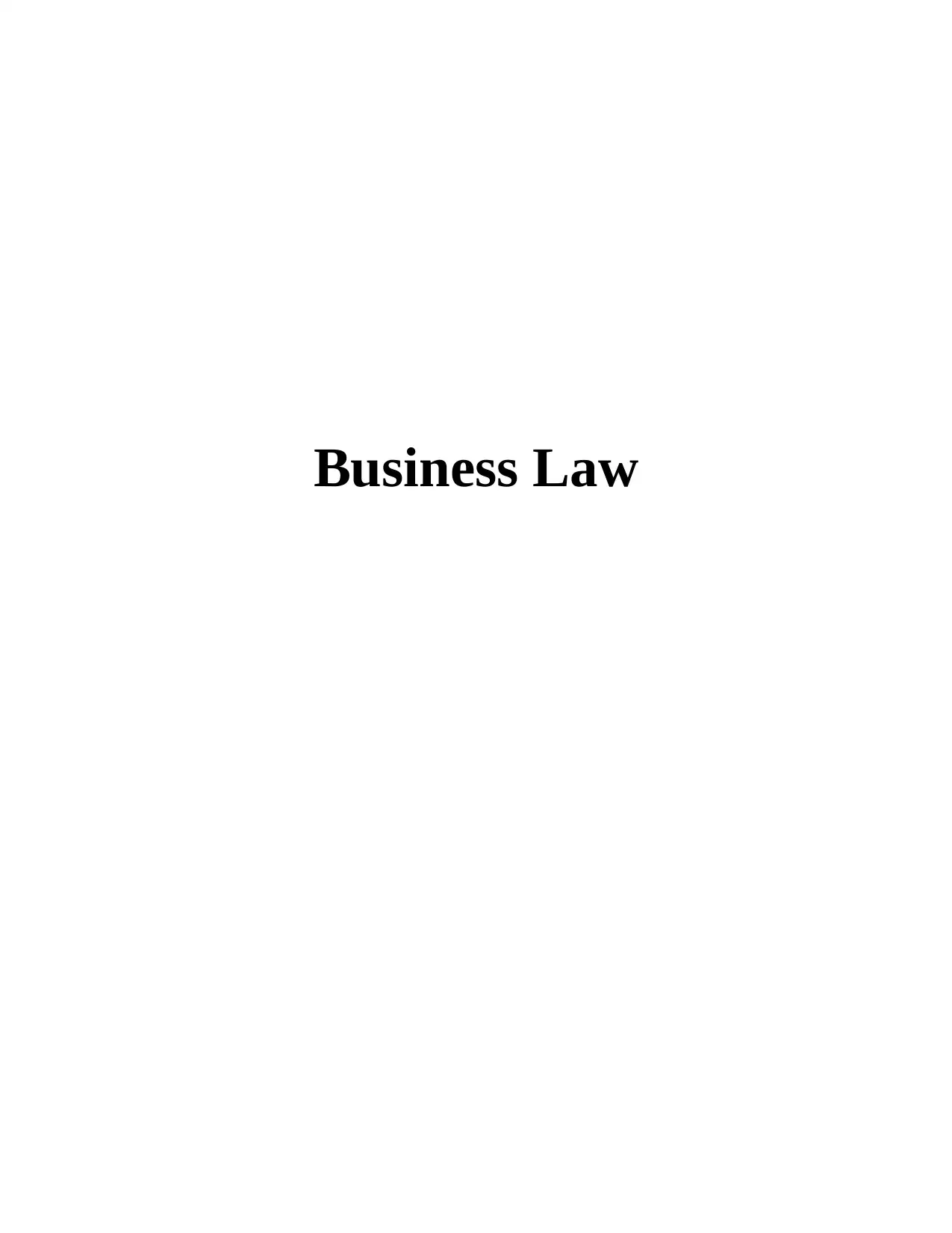
Business Law
Secure Best Marks with AI Grader
Need help grading? Try our AI Grader for instant feedback on your assignments.
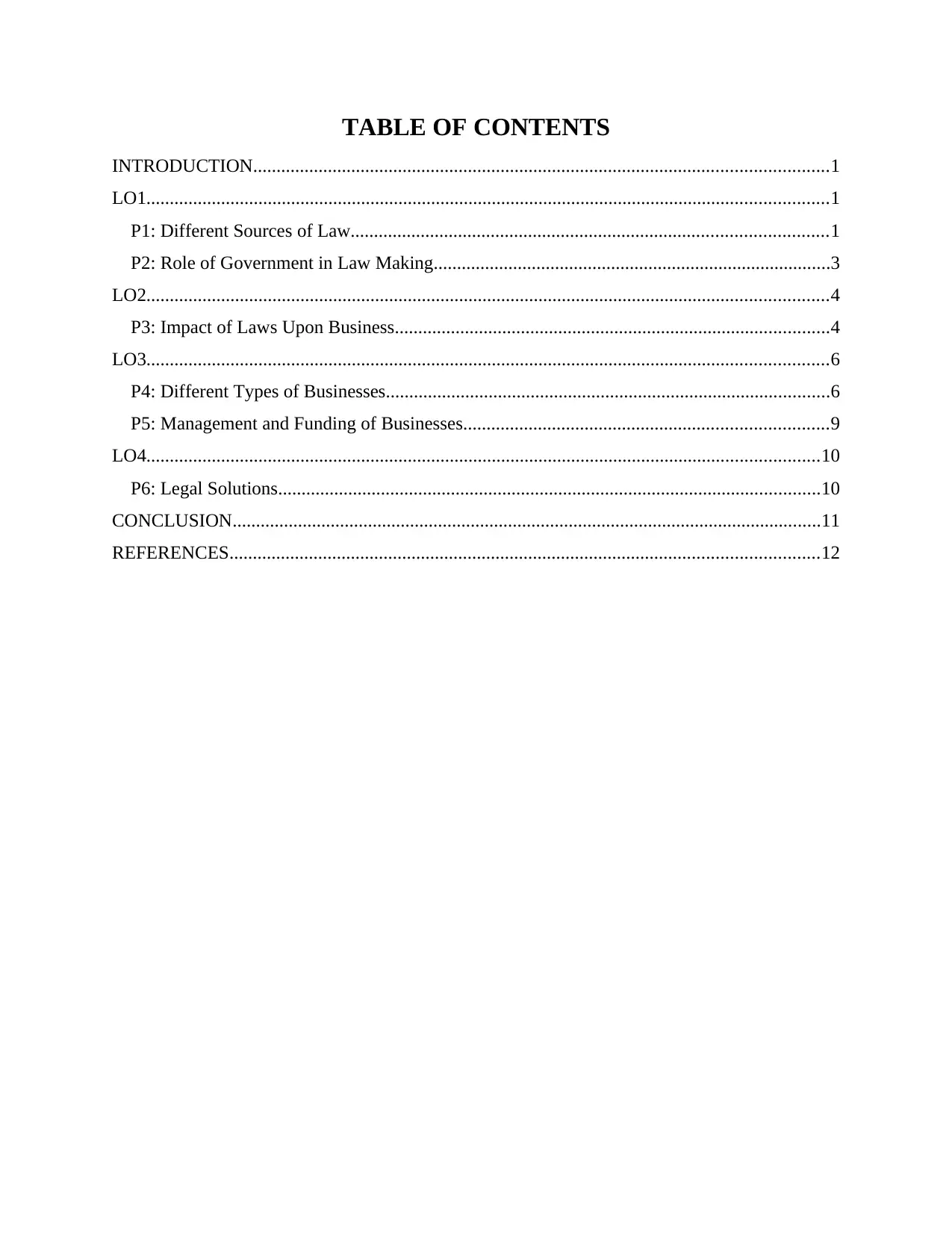
TABLE OF CONTENTS
INTRODUCTION...........................................................................................................................1
LO1..................................................................................................................................................1
P1: Different Sources of Law......................................................................................................1
P2: Role of Government in Law Making.....................................................................................3
LO2..................................................................................................................................................4
P3: Impact of Laws Upon Business.............................................................................................4
LO3..................................................................................................................................................6
P4: Different Types of Businesses...............................................................................................6
P5: Management and Funding of Businesses..............................................................................9
LO4................................................................................................................................................10
P6: Legal Solutions....................................................................................................................10
CONCLUSION..............................................................................................................................11
REFERENCES..............................................................................................................................12
INTRODUCTION...........................................................................................................................1
LO1..................................................................................................................................................1
P1: Different Sources of Law......................................................................................................1
P2: Role of Government in Law Making.....................................................................................3
LO2..................................................................................................................................................4
P3: Impact of Laws Upon Business.............................................................................................4
LO3..................................................................................................................................................6
P4: Different Types of Businesses...............................................................................................6
P5: Management and Funding of Businesses..............................................................................9
LO4................................................................................................................................................10
P6: Legal Solutions....................................................................................................................10
CONCLUSION..............................................................................................................................11
REFERENCES..............................................................................................................................12
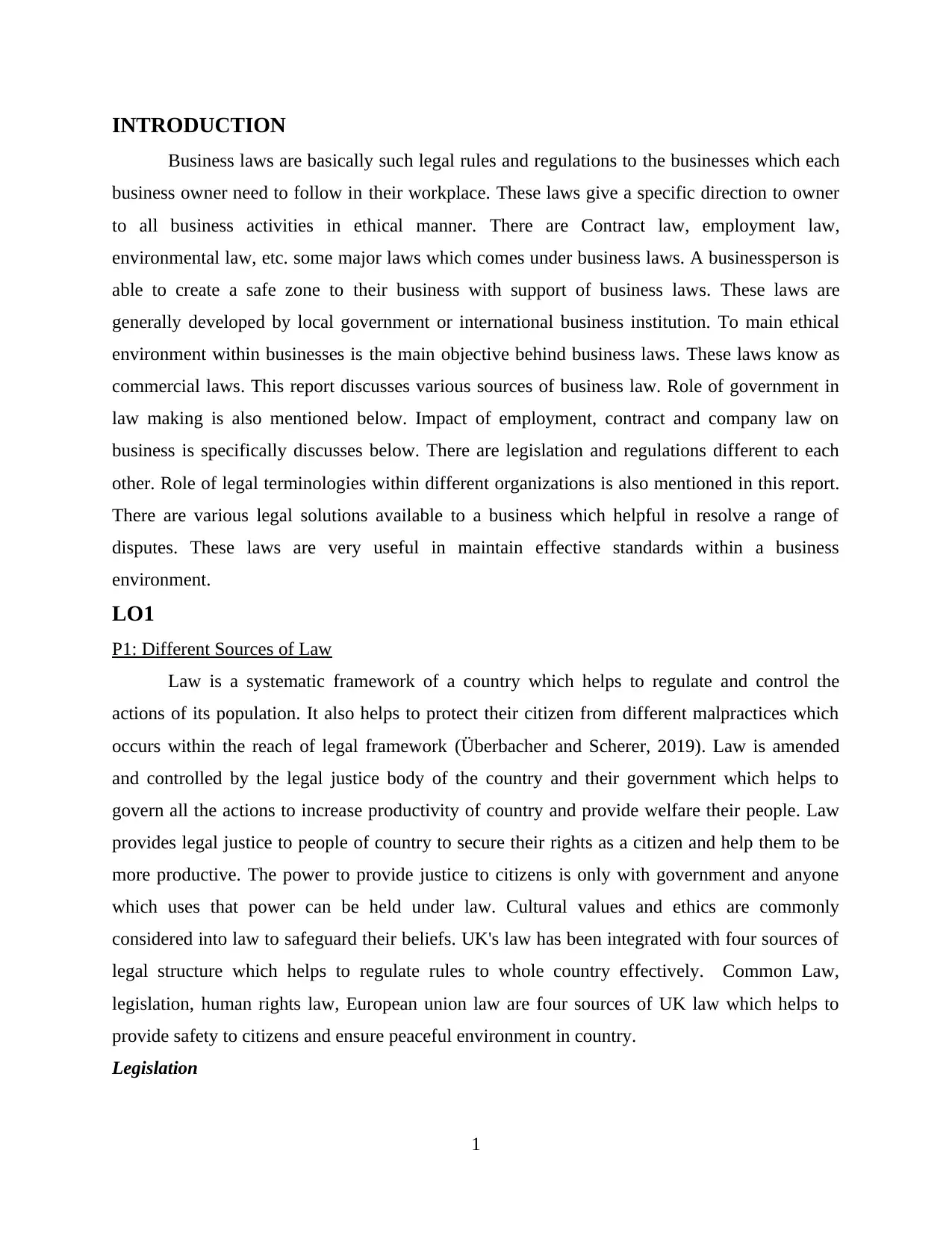
INTRODUCTION
Business laws are basically such legal rules and regulations to the businesses which each
business owner need to follow in their workplace. These laws give a specific direction to owner
to all business activities in ethical manner. There are Contract law, employment law,
environmental law, etc. some major laws which comes under business laws. A businessperson is
able to create a safe zone to their business with support of business laws. These laws are
generally developed by local government or international business institution. To main ethical
environment within businesses is the main objective behind business laws. These laws know as
commercial laws. This report discusses various sources of business law. Role of government in
law making is also mentioned below. Impact of employment, contract and company law on
business is specifically discusses below. There are legislation and regulations different to each
other. Role of legal terminologies within different organizations is also mentioned in this report.
There are various legal solutions available to a business which helpful in resolve a range of
disputes. These laws are very useful in maintain effective standards within a business
environment.
LO1
P1: Different Sources of Law
Law is a systematic framework of a country which helps to regulate and control the
actions of its population. It also helps to protect their citizen from different malpractices which
occurs within the reach of legal framework (Überbacher and Scherer, 2019). Law is amended
and controlled by the legal justice body of the country and their government which helps to
govern all the actions to increase productivity of country and provide welfare their people. Law
provides legal justice to people of country to secure their rights as a citizen and help them to be
more productive. The power to provide justice to citizens is only with government and anyone
which uses that power can be held under law. Cultural values and ethics are commonly
considered into law to safeguard their beliefs. UK's law has been integrated with four sources of
legal structure which helps to regulate rules to whole country effectively. Common Law,
legislation, human rights law, European union law are four sources of UK law which helps to
provide safety to citizens and ensure peaceful environment in country.
Legislation
1
Business laws are basically such legal rules and regulations to the businesses which each
business owner need to follow in their workplace. These laws give a specific direction to owner
to all business activities in ethical manner. There are Contract law, employment law,
environmental law, etc. some major laws which comes under business laws. A businessperson is
able to create a safe zone to their business with support of business laws. These laws are
generally developed by local government or international business institution. To main ethical
environment within businesses is the main objective behind business laws. These laws know as
commercial laws. This report discusses various sources of business law. Role of government in
law making is also mentioned below. Impact of employment, contract and company law on
business is specifically discusses below. There are legislation and regulations different to each
other. Role of legal terminologies within different organizations is also mentioned in this report.
There are various legal solutions available to a business which helpful in resolve a range of
disputes. These laws are very useful in maintain effective standards within a business
environment.
LO1
P1: Different Sources of Law
Law is a systematic framework of a country which helps to regulate and control the
actions of its population. It also helps to protect their citizen from different malpractices which
occurs within the reach of legal framework (Überbacher and Scherer, 2019). Law is amended
and controlled by the legal justice body of the country and their government which helps to
govern all the actions to increase productivity of country and provide welfare their people. Law
provides legal justice to people of country to secure their rights as a citizen and help them to be
more productive. The power to provide justice to citizens is only with government and anyone
which uses that power can be held under law. Cultural values and ethics are commonly
considered into law to safeguard their beliefs. UK's law has been integrated with four sources of
legal structure which helps to regulate rules to whole country effectively. Common Law,
legislation, human rights law, European union law are four sources of UK law which helps to
provide safety to citizens and ensure peaceful environment in country.
Legislation
1
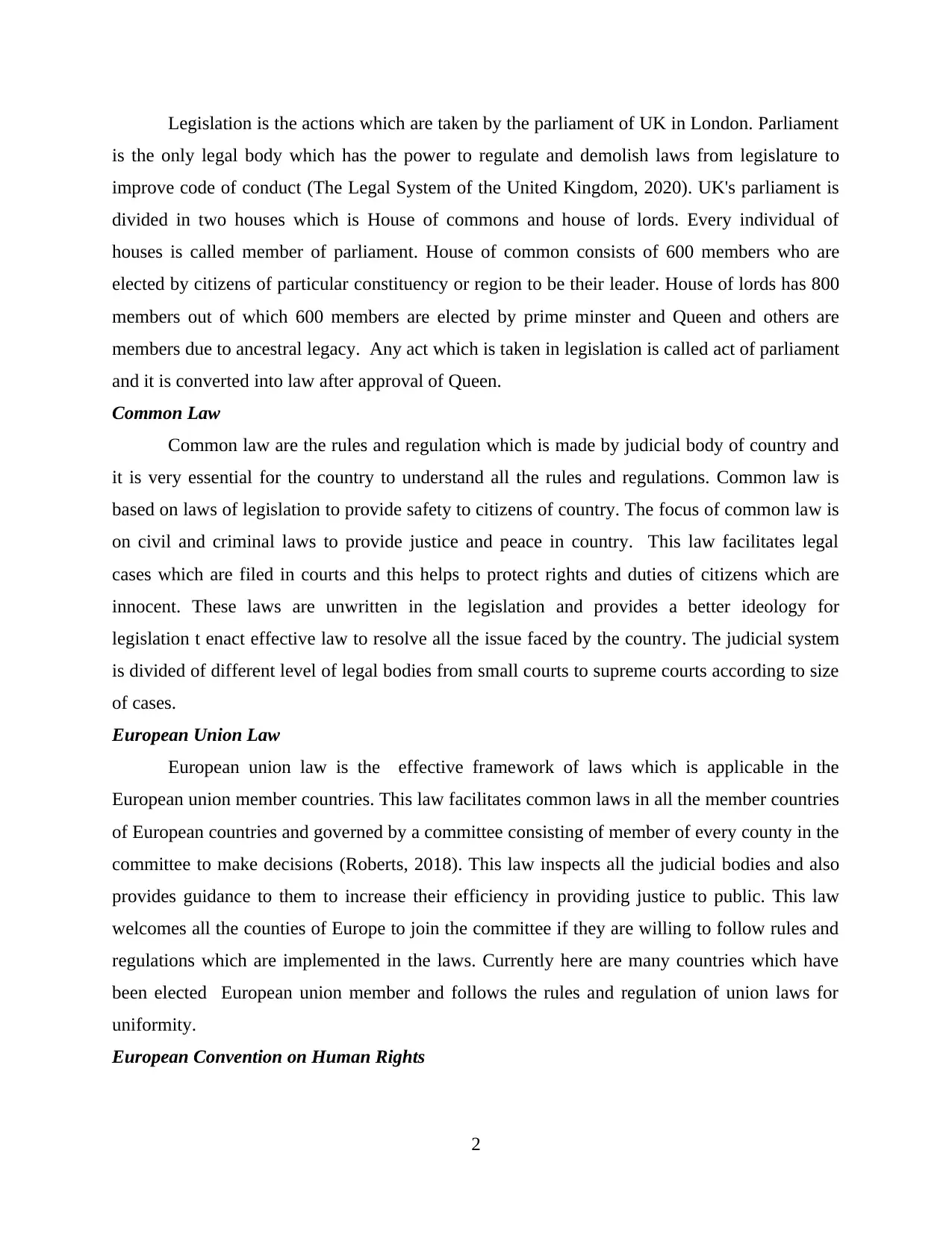
Legislation is the actions which are taken by the parliament of UK in London. Parliament
is the only legal body which has the power to regulate and demolish laws from legislature to
improve code of conduct (The Legal System of the United Kingdom, 2020). UK's parliament is
divided in two houses which is House of commons and house of lords. Every individual of
houses is called member of parliament. House of common consists of 600 members who are
elected by citizens of particular constituency or region to be their leader. House of lords has 800
members out of which 600 members are elected by prime minster and Queen and others are
members due to ancestral legacy. Any act which is taken in legislation is called act of parliament
and it is converted into law after approval of Queen.
Common Law
Common law are the rules and regulation which is made by judicial body of country and
it is very essential for the country to understand all the rules and regulations. Common law is
based on laws of legislation to provide safety to citizens of country. The focus of common law is
on civil and criminal laws to provide justice and peace in country. This law facilitates legal
cases which are filed in courts and this helps to protect rights and duties of citizens which are
innocent. These laws are unwritten in the legislation and provides a better ideology for
legislation t enact effective law to resolve all the issue faced by the country. The judicial system
is divided of different level of legal bodies from small courts to supreme courts according to size
of cases.
European Union Law
European union law is the effective framework of laws which is applicable in the
European union member countries. This law facilitates common laws in all the member countries
of European countries and governed by a committee consisting of member of every county in the
committee to make decisions (Roberts, 2018). This law inspects all the judicial bodies and also
provides guidance to them to increase their efficiency in providing justice to public. This law
welcomes all the counties of Europe to join the committee if they are willing to follow rules and
regulations which are implemented in the laws. Currently here are many countries which have
been elected European union member and follows the rules and regulation of union laws for
uniformity.
European Convention on Human Rights
2
is the only legal body which has the power to regulate and demolish laws from legislature to
improve code of conduct (The Legal System of the United Kingdom, 2020). UK's parliament is
divided in two houses which is House of commons and house of lords. Every individual of
houses is called member of parliament. House of common consists of 600 members who are
elected by citizens of particular constituency or region to be their leader. House of lords has 800
members out of which 600 members are elected by prime minster and Queen and others are
members due to ancestral legacy. Any act which is taken in legislation is called act of parliament
and it is converted into law after approval of Queen.
Common Law
Common law are the rules and regulation which is made by judicial body of country and
it is very essential for the country to understand all the rules and regulations. Common law is
based on laws of legislation to provide safety to citizens of country. The focus of common law is
on civil and criminal laws to provide justice and peace in country. This law facilitates legal
cases which are filed in courts and this helps to protect rights and duties of citizens which are
innocent. These laws are unwritten in the legislation and provides a better ideology for
legislation t enact effective law to resolve all the issue faced by the country. The judicial system
is divided of different level of legal bodies from small courts to supreme courts according to size
of cases.
European Union Law
European union law is the effective framework of laws which is applicable in the
European union member countries. This law facilitates common laws in all the member countries
of European countries and governed by a committee consisting of member of every county in the
committee to make decisions (Roberts, 2018). This law inspects all the judicial bodies and also
provides guidance to them to increase their efficiency in providing justice to public. This law
welcomes all the counties of Europe to join the committee if they are willing to follow rules and
regulations which are implemented in the laws. Currently here are many countries which have
been elected European union member and follows the rules and regulation of union laws for
uniformity.
European Convention on Human Rights
2
Secure Best Marks with AI Grader
Need help grading? Try our AI Grader for instant feedback on your assignments.
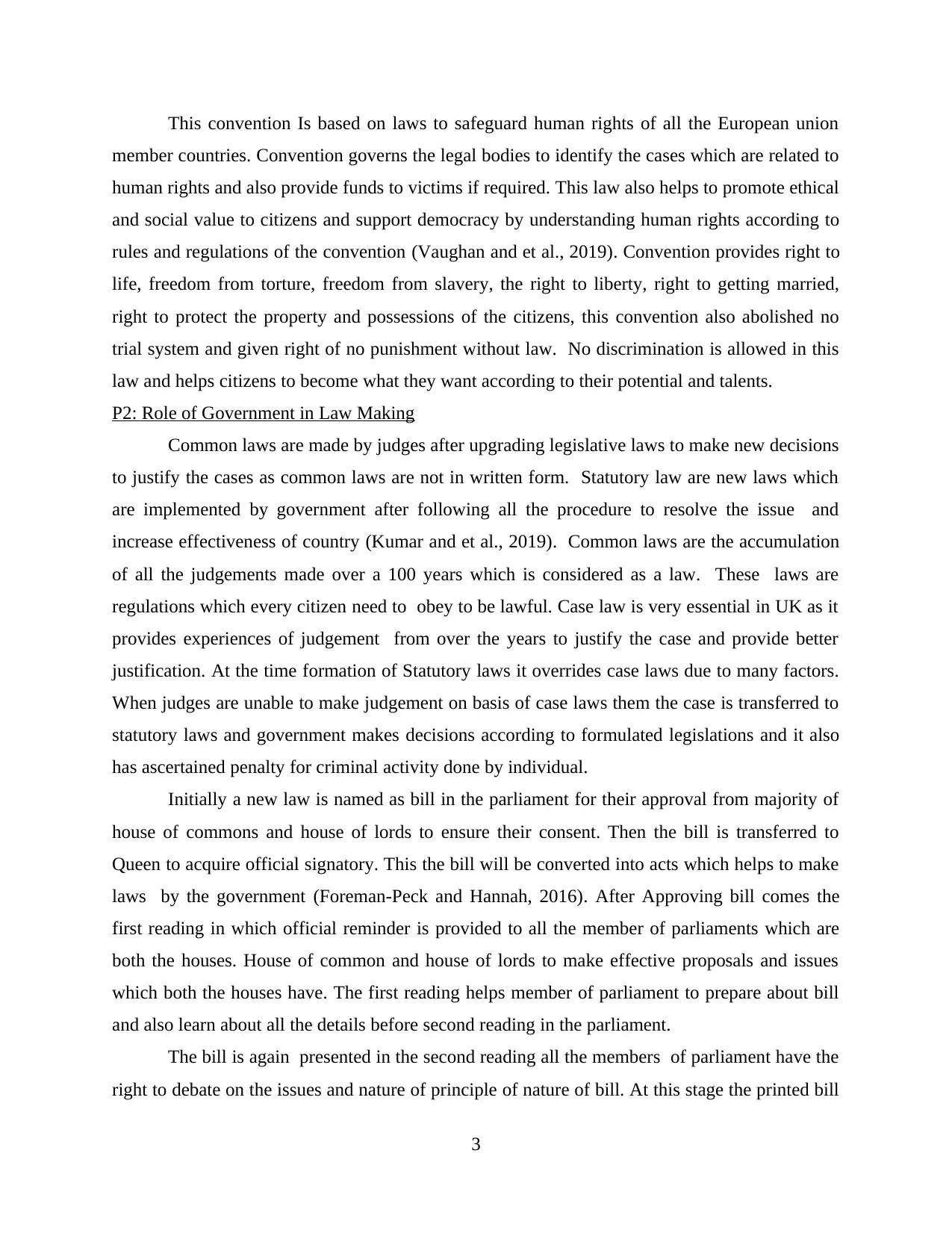
This convention Is based on laws to safeguard human rights of all the European union
member countries. Convention governs the legal bodies to identify the cases which are related to
human rights and also provide funds to victims if required. This law also helps to promote ethical
and social value to citizens and support democracy by understanding human rights according to
rules and regulations of the convention (Vaughan and et al., 2019). Convention provides right to
life, freedom from torture, freedom from slavery, the right to liberty, right to getting married,
right to protect the property and possessions of the citizens, this convention also abolished no
trial system and given right of no punishment without law. No discrimination is allowed in this
law and helps citizens to become what they want according to their potential and talents.
P2: Role of Government in Law Making
Common laws are made by judges after upgrading legislative laws to make new decisions
to justify the cases as common laws are not in written form. Statutory law are new laws which
are implemented by government after following all the procedure to resolve the issue and
increase effectiveness of country (Kumar and et al., 2019). Common laws are the accumulation
of all the judgements made over a 100 years which is considered as a law. These laws are
regulations which every citizen need to obey to be lawful. Case law is very essential in UK as it
provides experiences of judgement from over the years to justify the case and provide better
justification. At the time formation of Statutory laws it overrides case laws due to many factors.
When judges are unable to make judgement on basis of case laws them the case is transferred to
statutory laws and government makes decisions according to formulated legislations and it also
has ascertained penalty for criminal activity done by individual.
Initially a new law is named as bill in the parliament for their approval from majority of
house of commons and house of lords to ensure their consent. Then the bill is transferred to
Queen to acquire official signatory. This the bill will be converted into acts which helps to make
laws by the government (Foreman-Peck and Hannah, 2016). After Approving bill comes the
first reading in which official reminder is provided to all the member of parliaments which are
both the houses. House of common and house of lords to make effective proposals and issues
which both the houses have. The first reading helps member of parliament to prepare about bill
and also learn about all the details before second reading in the parliament.
The bill is again presented in the second reading all the members of parliament have the
right to debate on the issues and nature of principle of nature of bill. At this stage the printed bill
3
member countries. Convention governs the legal bodies to identify the cases which are related to
human rights and also provide funds to victims if required. This law also helps to promote ethical
and social value to citizens and support democracy by understanding human rights according to
rules and regulations of the convention (Vaughan and et al., 2019). Convention provides right to
life, freedom from torture, freedom from slavery, the right to liberty, right to getting married,
right to protect the property and possessions of the citizens, this convention also abolished no
trial system and given right of no punishment without law. No discrimination is allowed in this
law and helps citizens to become what they want according to their potential and talents.
P2: Role of Government in Law Making
Common laws are made by judges after upgrading legislative laws to make new decisions
to justify the cases as common laws are not in written form. Statutory law are new laws which
are implemented by government after following all the procedure to resolve the issue and
increase effectiveness of country (Kumar and et al., 2019). Common laws are the accumulation
of all the judgements made over a 100 years which is considered as a law. These laws are
regulations which every citizen need to obey to be lawful. Case law is very essential in UK as it
provides experiences of judgement from over the years to justify the case and provide better
justification. At the time formation of Statutory laws it overrides case laws due to many factors.
When judges are unable to make judgement on basis of case laws them the case is transferred to
statutory laws and government makes decisions according to formulated legislations and it also
has ascertained penalty for criminal activity done by individual.
Initially a new law is named as bill in the parliament for their approval from majority of
house of commons and house of lords to ensure their consent. Then the bill is transferred to
Queen to acquire official signatory. This the bill will be converted into acts which helps to make
laws by the government (Foreman-Peck and Hannah, 2016). After Approving bill comes the
first reading in which official reminder is provided to all the member of parliaments which are
both the houses. House of common and house of lords to make effective proposals and issues
which both the houses have. The first reading helps member of parliament to prepare about bill
and also learn about all the details before second reading in the parliament.
The bill is again presented in the second reading all the members of parliament have the
right to debate on the issues and nature of principle of nature of bill. At this stage the printed bill
3
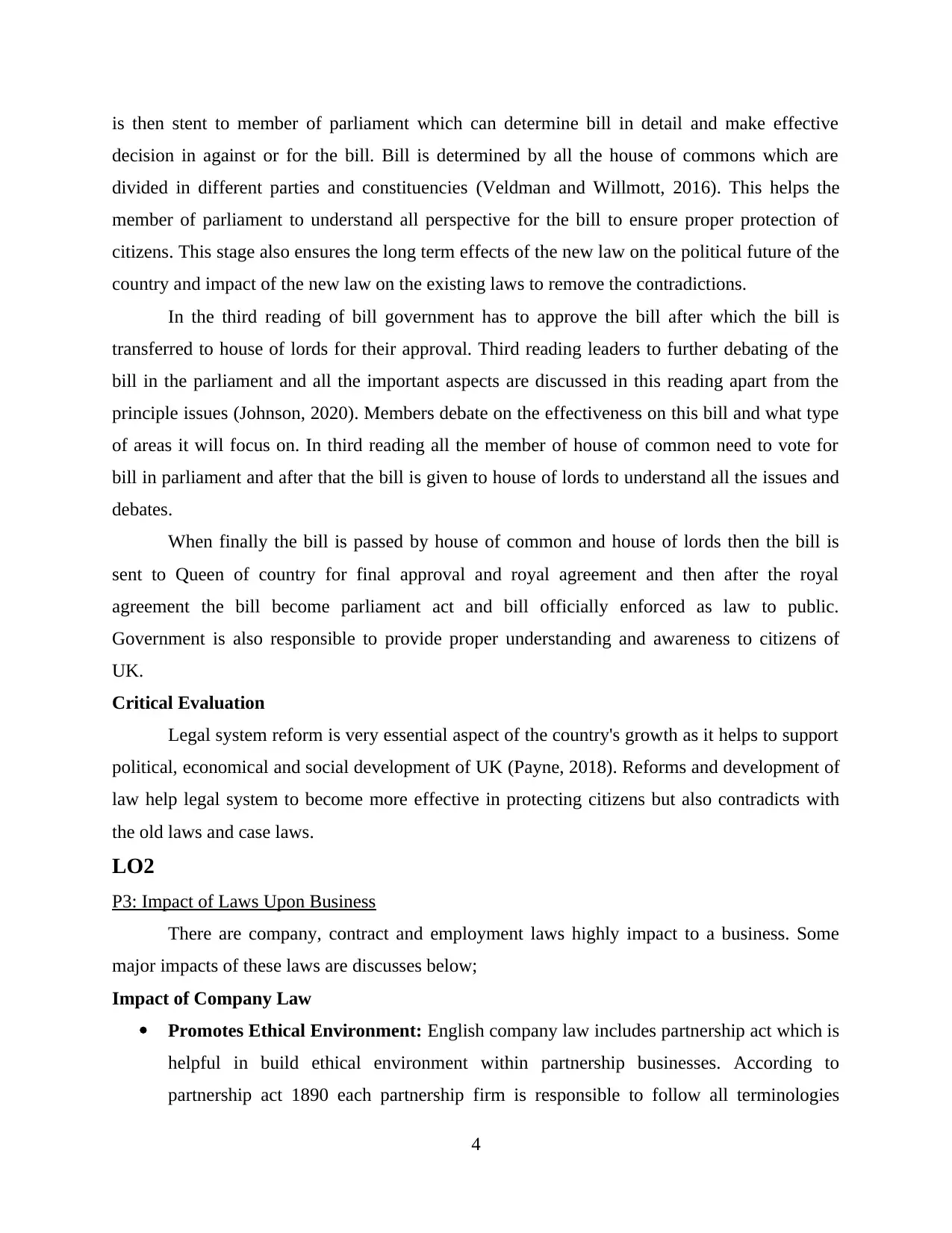
is then stent to member of parliament which can determine bill in detail and make effective
decision in against or for the bill. Bill is determined by all the house of commons which are
divided in different parties and constituencies (Veldman and Willmott, 2016). This helps the
member of parliament to understand all perspective for the bill to ensure proper protection of
citizens. This stage also ensures the long term effects of the new law on the political future of the
country and impact of the new law on the existing laws to remove the contradictions.
In the third reading of bill government has to approve the bill after which the bill is
transferred to house of lords for their approval. Third reading leaders to further debating of the
bill in the parliament and all the important aspects are discussed in this reading apart from the
principle issues (Johnson, 2020). Members debate on the effectiveness on this bill and what type
of areas it will focus on. In third reading all the member of house of common need to vote for
bill in parliament and after that the bill is given to house of lords to understand all the issues and
debates.
When finally the bill is passed by house of common and house of lords then the bill is
sent to Queen of country for final approval and royal agreement and then after the royal
agreement the bill become parliament act and bill officially enforced as law to public.
Government is also responsible to provide proper understanding and awareness to citizens of
UK.
Critical Evaluation
Legal system reform is very essential aspect of the country's growth as it helps to support
political, economical and social development of UK (Payne, 2018). Reforms and development of
law help legal system to become more effective in protecting citizens but also contradicts with
the old laws and case laws.
LO2
P3: Impact of Laws Upon Business
There are company, contract and employment laws highly impact to a business. Some
major impacts of these laws are discusses below;
Impact of Company Law
Promotes Ethical Environment: English company law includes partnership act which is
helpful in build ethical environment within partnership businesses. According to
partnership act 1890 each partnership firm is responsible to follow all terminologies
4
decision in against or for the bill. Bill is determined by all the house of commons which are
divided in different parties and constituencies (Veldman and Willmott, 2016). This helps the
member of parliament to understand all perspective for the bill to ensure proper protection of
citizens. This stage also ensures the long term effects of the new law on the political future of the
country and impact of the new law on the existing laws to remove the contradictions.
In the third reading of bill government has to approve the bill after which the bill is
transferred to house of lords for their approval. Third reading leaders to further debating of the
bill in the parliament and all the important aspects are discussed in this reading apart from the
principle issues (Johnson, 2020). Members debate on the effectiveness on this bill and what type
of areas it will focus on. In third reading all the member of house of common need to vote for
bill in parliament and after that the bill is given to house of lords to understand all the issues and
debates.
When finally the bill is passed by house of common and house of lords then the bill is
sent to Queen of country for final approval and royal agreement and then after the royal
agreement the bill become parliament act and bill officially enforced as law to public.
Government is also responsible to provide proper understanding and awareness to citizens of
UK.
Critical Evaluation
Legal system reform is very essential aspect of the country's growth as it helps to support
political, economical and social development of UK (Payne, 2018). Reforms and development of
law help legal system to become more effective in protecting citizens but also contradicts with
the old laws and case laws.
LO2
P3: Impact of Laws Upon Business
There are company, contract and employment laws highly impact to a business. Some
major impacts of these laws are discusses below;
Impact of Company Law
Promotes Ethical Environment: English company law includes partnership act which is
helpful in build ethical environment within partnership businesses. According to
partnership act 1890 each partnership firm is responsible to follow all terminologies
4
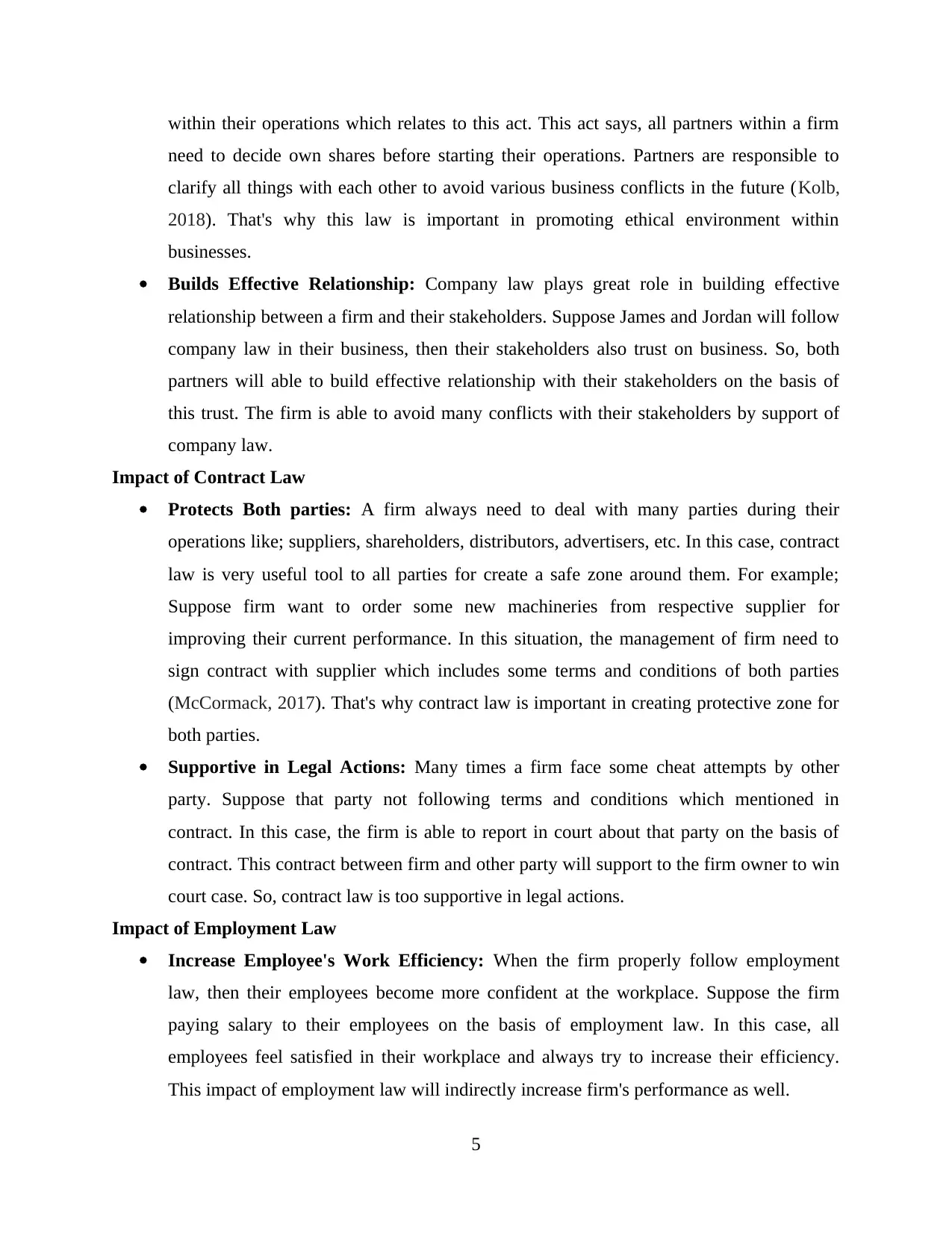
within their operations which relates to this act. This act says, all partners within a firm
need to decide own shares before starting their operations. Partners are responsible to
clarify all things with each other to avoid various business conflicts in the future (Kolb,
2018). That's why this law is important in promoting ethical environment within
businesses.
Builds Effective Relationship: Company law plays great role in building effective
relationship between a firm and their stakeholders. Suppose James and Jordan will follow
company law in their business, then their stakeholders also trust on business. So, both
partners will able to build effective relationship with their stakeholders on the basis of
this trust. The firm is able to avoid many conflicts with their stakeholders by support of
company law.
Impact of Contract Law
Protects Both parties: A firm always need to deal with many parties during their
operations like; suppliers, shareholders, distributors, advertisers, etc. In this case, contract
law is very useful tool to all parties for create a safe zone around them. For example;
Suppose firm want to order some new machineries from respective supplier for
improving their current performance. In this situation, the management of firm need to
sign contract with supplier which includes some terms and conditions of both parties
(McCormack, 2017). That's why contract law is important in creating protective zone for
both parties.
Supportive in Legal Actions: Many times a firm face some cheat attempts by other
party. Suppose that party not following terms and conditions which mentioned in
contract. In this case, the firm is able to report in court about that party on the basis of
contract. This contract between firm and other party will support to the firm owner to win
court case. So, contract law is too supportive in legal actions.
Impact of Employment Law
Increase Employee's Work Efficiency: When the firm properly follow employment
law, then their employees become more confident at the workplace. Suppose the firm
paying salary to their employees on the basis of employment law. In this case, all
employees feel satisfied in their workplace and always try to increase their efficiency.
This impact of employment law will indirectly increase firm's performance as well.
5
need to decide own shares before starting their operations. Partners are responsible to
clarify all things with each other to avoid various business conflicts in the future (Kolb,
2018). That's why this law is important in promoting ethical environment within
businesses.
Builds Effective Relationship: Company law plays great role in building effective
relationship between a firm and their stakeholders. Suppose James and Jordan will follow
company law in their business, then their stakeholders also trust on business. So, both
partners will able to build effective relationship with their stakeholders on the basis of
this trust. The firm is able to avoid many conflicts with their stakeholders by support of
company law.
Impact of Contract Law
Protects Both parties: A firm always need to deal with many parties during their
operations like; suppliers, shareholders, distributors, advertisers, etc. In this case, contract
law is very useful tool to all parties for create a safe zone around them. For example;
Suppose firm want to order some new machineries from respective supplier for
improving their current performance. In this situation, the management of firm need to
sign contract with supplier which includes some terms and conditions of both parties
(McCormack, 2017). That's why contract law is important in creating protective zone for
both parties.
Supportive in Legal Actions: Many times a firm face some cheat attempts by other
party. Suppose that party not following terms and conditions which mentioned in
contract. In this case, the firm is able to report in court about that party on the basis of
contract. This contract between firm and other party will support to the firm owner to win
court case. So, contract law is too supportive in legal actions.
Impact of Employment Law
Increase Employee's Work Efficiency: When the firm properly follow employment
law, then their employees become more confident at the workplace. Suppose the firm
paying salary to their employees on the basis of employment law. In this case, all
employees feel satisfied in their workplace and always try to increase their efficiency.
This impact of employment law will indirectly increase firm's performance as well.
5
Paraphrase This Document
Need a fresh take? Get an instant paraphrase of this document with our AI Paraphraser
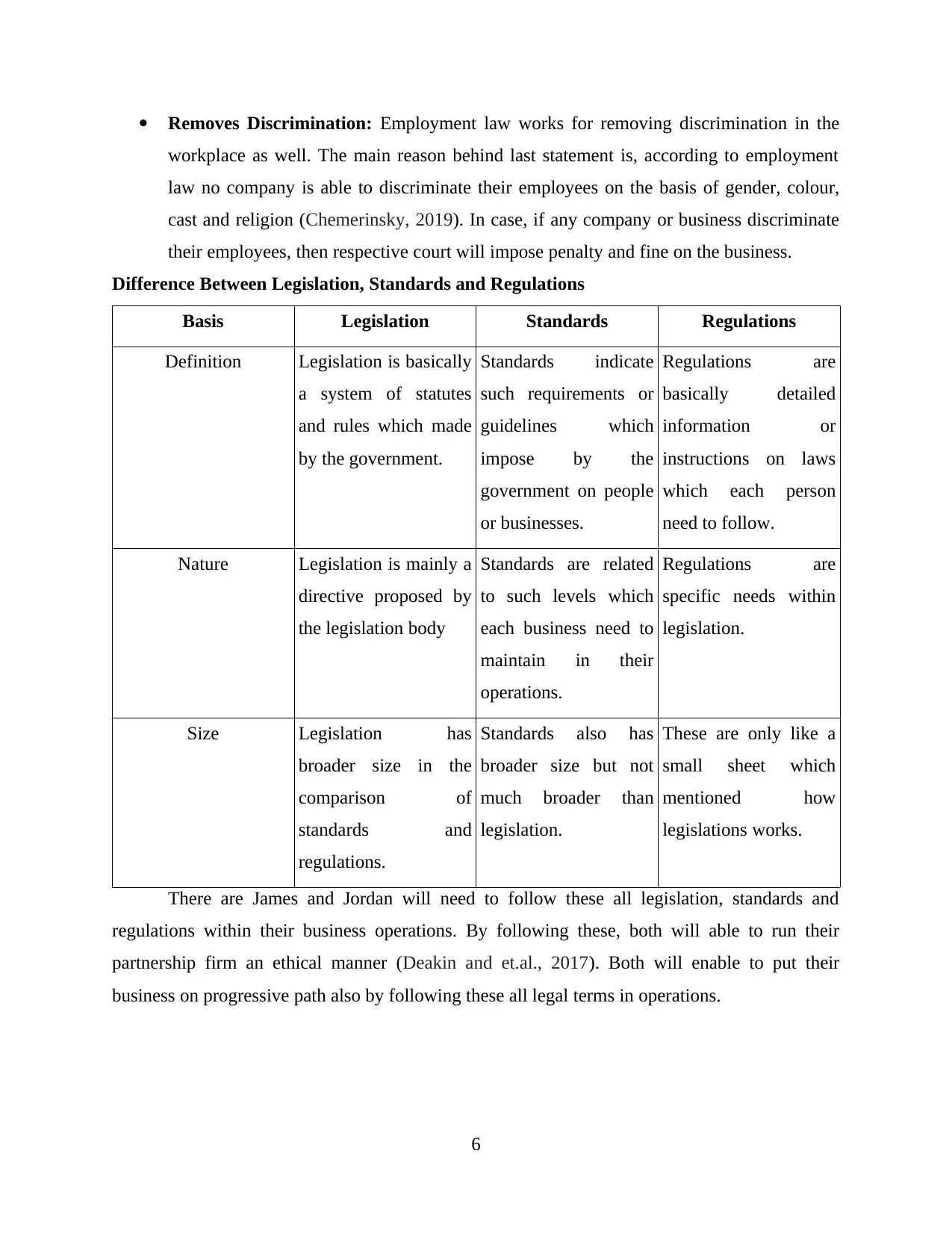
Removes Discrimination: Employment law works for removing discrimination in the
workplace as well. The main reason behind last statement is, according to employment
law no company is able to discriminate their employees on the basis of gender, colour,
cast and religion (Chemerinsky, 2019). In case, if any company or business discriminate
their employees, then respective court will impose penalty and fine on the business.
Difference Between Legislation, Standards and Regulations
Basis Legislation Standards Regulations
Definition Legislation is basically
a system of statutes
and rules which made
by the government.
Standards indicate
such requirements or
guidelines which
impose by the
government on people
or businesses.
Regulations are
basically detailed
information or
instructions on laws
which each person
need to follow.
Nature Legislation is mainly a
directive proposed by
the legislation body
Standards are related
to such levels which
each business need to
maintain in their
operations.
Regulations are
specific needs within
legislation.
Size Legislation has
broader size in the
comparison of
standards and
regulations.
Standards also has
broader size but not
much broader than
legislation.
These are only like a
small sheet which
mentioned how
legislations works.
There are James and Jordan will need to follow these all legislation, standards and
regulations within their business operations. By following these, both will able to run their
partnership firm an ethical manner (Deakin and et.al., 2017). Both will enable to put their
business on progressive path also by following these all legal terms in operations.
6
workplace as well. The main reason behind last statement is, according to employment
law no company is able to discriminate their employees on the basis of gender, colour,
cast and religion (Chemerinsky, 2019). In case, if any company or business discriminate
their employees, then respective court will impose penalty and fine on the business.
Difference Between Legislation, Standards and Regulations
Basis Legislation Standards Regulations
Definition Legislation is basically
a system of statutes
and rules which made
by the government.
Standards indicate
such requirements or
guidelines which
impose by the
government on people
or businesses.
Regulations are
basically detailed
information or
instructions on laws
which each person
need to follow.
Nature Legislation is mainly a
directive proposed by
the legislation body
Standards are related
to such levels which
each business need to
maintain in their
operations.
Regulations are
specific needs within
legislation.
Size Legislation has
broader size in the
comparison of
standards and
regulations.
Standards also has
broader size but not
much broader than
legislation.
These are only like a
small sheet which
mentioned how
legislations works.
There are James and Jordan will need to follow these all legislation, standards and
regulations within their business operations. By following these, both will able to run their
partnership firm an ethical manner (Deakin and et.al., 2017). Both will enable to put their
business on progressive path also by following these all legal terms in operations.
6
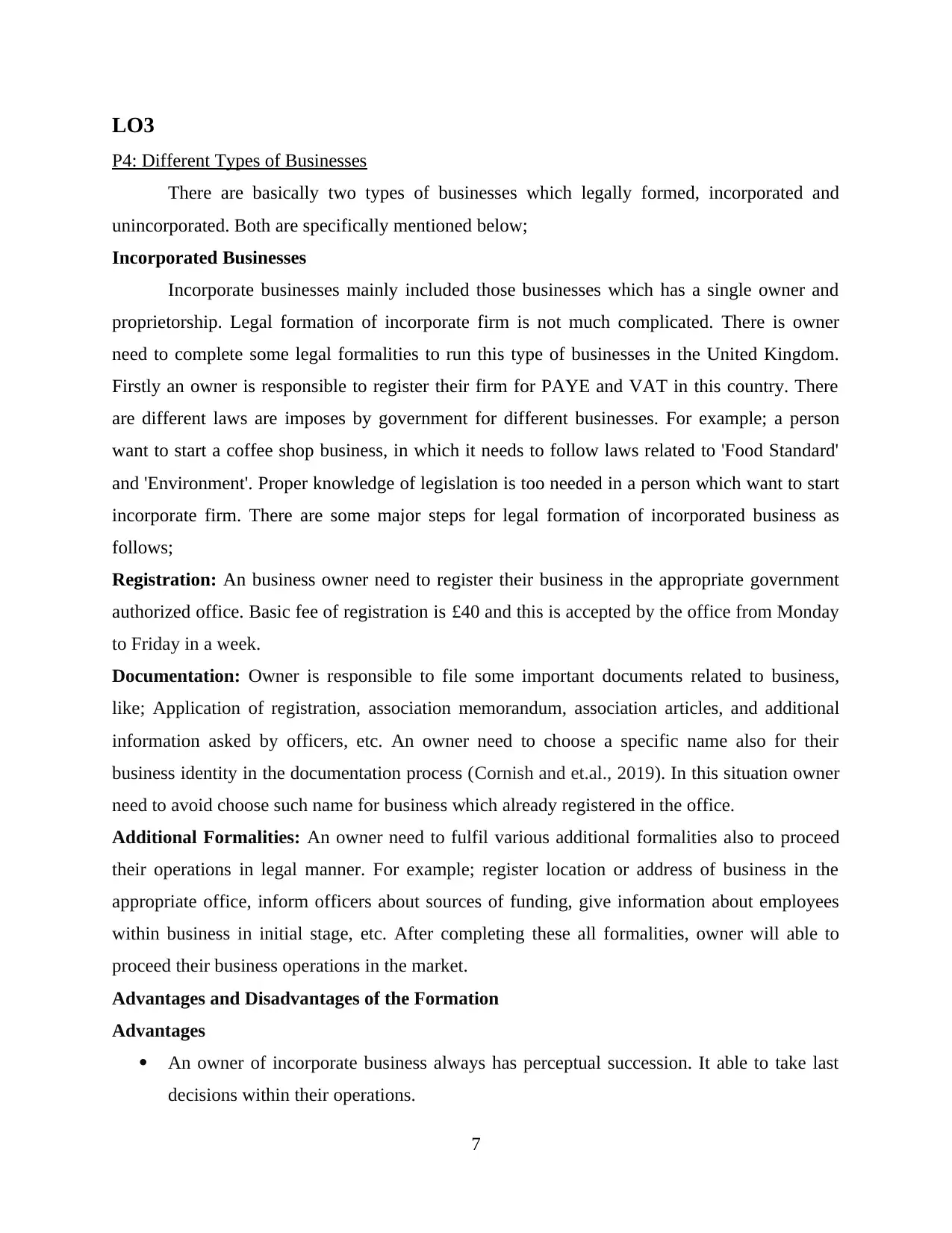
LO3
P4: Different Types of Businesses
There are basically two types of businesses which legally formed, incorporated and
unincorporated. Both are specifically mentioned below;
Incorporated Businesses
Incorporate businesses mainly included those businesses which has a single owner and
proprietorship. Legal formation of incorporate firm is not much complicated. There is owner
need to complete some legal formalities to run this type of businesses in the United Kingdom.
Firstly an owner is responsible to register their firm for PAYE and VAT in this country. There
are different laws are imposes by government for different businesses. For example; a person
want to start a coffee shop business, in which it needs to follow laws related to 'Food Standard'
and 'Environment'. Proper knowledge of legislation is too needed in a person which want to start
incorporate firm. There are some major steps for legal formation of incorporated business as
follows;
Registration: An business owner need to register their business in the appropriate government
authorized office. Basic fee of registration is £40 and this is accepted by the office from Monday
to Friday in a week.
Documentation: Owner is responsible to file some important documents related to business,
like; Application of registration, association memorandum, association articles, and additional
information asked by officers, etc. An owner need to choose a specific name also for their
business identity in the documentation process (Cornish and et.al., 2019). In this situation owner
need to avoid choose such name for business which already registered in the office.
Additional Formalities: An owner need to fulfil various additional formalities also to proceed
their operations in legal manner. For example; register location or address of business in the
appropriate office, inform officers about sources of funding, give information about employees
within business in initial stage, etc. After completing these all formalities, owner will able to
proceed their business operations in the market.
Advantages and Disadvantages of the Formation
Advantages
An owner of incorporate business always has perceptual succession. It able to take last
decisions within their operations.
7
P4: Different Types of Businesses
There are basically two types of businesses which legally formed, incorporated and
unincorporated. Both are specifically mentioned below;
Incorporated Businesses
Incorporate businesses mainly included those businesses which has a single owner and
proprietorship. Legal formation of incorporate firm is not much complicated. There is owner
need to complete some legal formalities to run this type of businesses in the United Kingdom.
Firstly an owner is responsible to register their firm for PAYE and VAT in this country. There
are different laws are imposes by government for different businesses. For example; a person
want to start a coffee shop business, in which it needs to follow laws related to 'Food Standard'
and 'Environment'. Proper knowledge of legislation is too needed in a person which want to start
incorporate firm. There are some major steps for legal formation of incorporated business as
follows;
Registration: An business owner need to register their business in the appropriate government
authorized office. Basic fee of registration is £40 and this is accepted by the office from Monday
to Friday in a week.
Documentation: Owner is responsible to file some important documents related to business,
like; Application of registration, association memorandum, association articles, and additional
information asked by officers, etc. An owner need to choose a specific name also for their
business identity in the documentation process (Cornish and et.al., 2019). In this situation owner
need to avoid choose such name for business which already registered in the office.
Additional Formalities: An owner need to fulfil various additional formalities also to proceed
their operations in legal manner. For example; register location or address of business in the
appropriate office, inform officers about sources of funding, give information about employees
within business in initial stage, etc. After completing these all formalities, owner will able to
proceed their business operations in the market.
Advantages and Disadvantages of the Formation
Advantages
An owner of incorporate business always has perceptual succession. It able to take last
decisions within their operations.
7
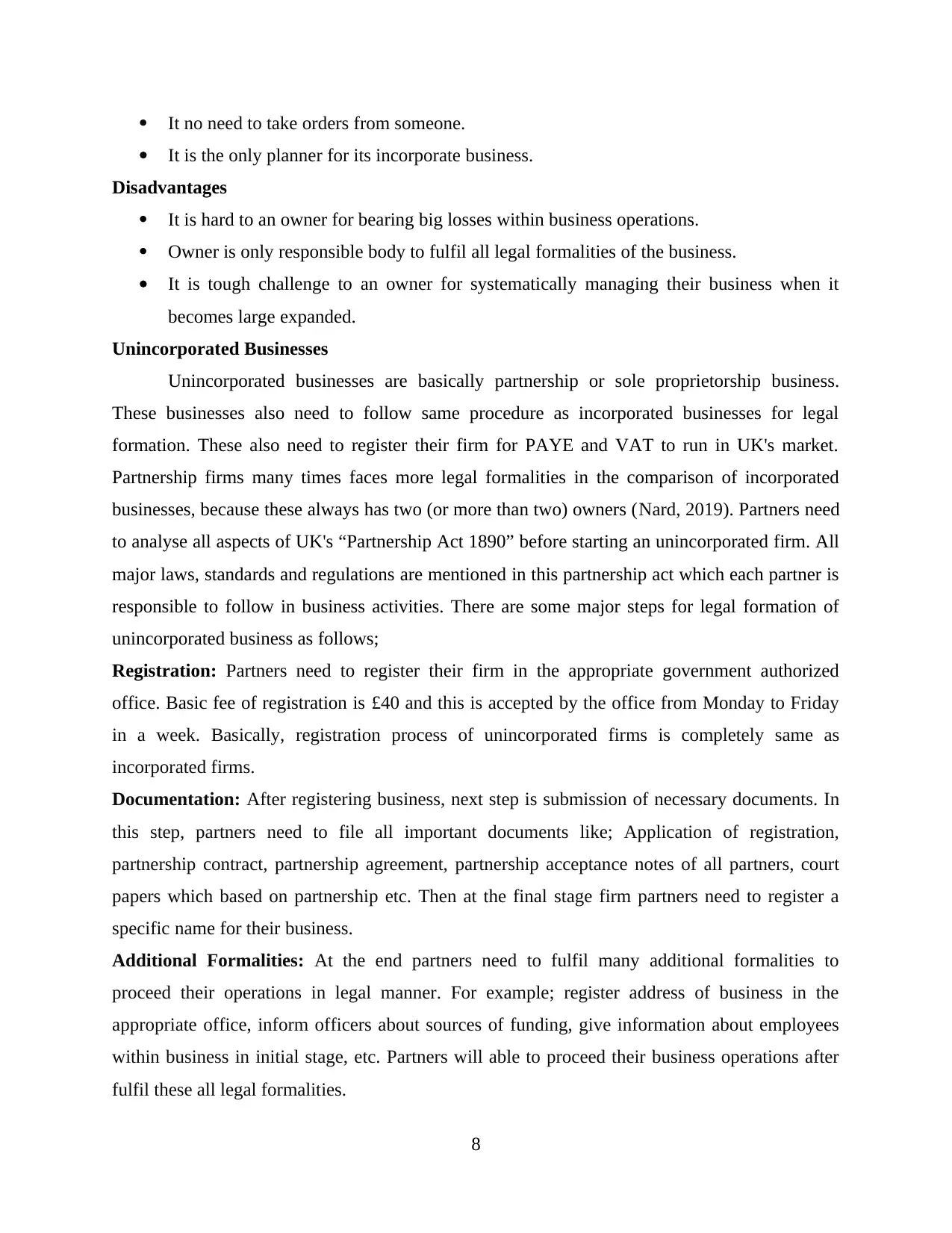
It no need to take orders from someone.
It is the only planner for its incorporate business.
Disadvantages
It is hard to an owner for bearing big losses within business operations.
Owner is only responsible body to fulfil all legal formalities of the business.
It is tough challenge to an owner for systematically managing their business when it
becomes large expanded.
Unincorporated Businesses
Unincorporated businesses are basically partnership or sole proprietorship business.
These businesses also need to follow same procedure as incorporated businesses for legal
formation. These also need to register their firm for PAYE and VAT to run in UK's market.
Partnership firms many times faces more legal formalities in the comparison of incorporated
businesses, because these always has two (or more than two) owners (Nard, 2019). Partners need
to analyse all aspects of UK's “Partnership Act 1890” before starting an unincorporated firm. All
major laws, standards and regulations are mentioned in this partnership act which each partner is
responsible to follow in business activities. There are some major steps for legal formation of
unincorporated business as follows;
Registration: Partners need to register their firm in the appropriate government authorized
office. Basic fee of registration is £40 and this is accepted by the office from Monday to Friday
in a week. Basically, registration process of unincorporated firms is completely same as
incorporated firms.
Documentation: After registering business, next step is submission of necessary documents. In
this step, partners need to file all important documents like; Application of registration,
partnership contract, partnership agreement, partnership acceptance notes of all partners, court
papers which based on partnership etc. Then at the final stage firm partners need to register a
specific name for their business.
Additional Formalities: At the end partners need to fulfil many additional formalities to
proceed their operations in legal manner. For example; register address of business in the
appropriate office, inform officers about sources of funding, give information about employees
within business in initial stage, etc. Partners will able to proceed their business operations after
fulfil these all legal formalities.
8
It is the only planner for its incorporate business.
Disadvantages
It is hard to an owner for bearing big losses within business operations.
Owner is only responsible body to fulfil all legal formalities of the business.
It is tough challenge to an owner for systematically managing their business when it
becomes large expanded.
Unincorporated Businesses
Unincorporated businesses are basically partnership or sole proprietorship business.
These businesses also need to follow same procedure as incorporated businesses for legal
formation. These also need to register their firm for PAYE and VAT to run in UK's market.
Partnership firms many times faces more legal formalities in the comparison of incorporated
businesses, because these always has two (or more than two) owners (Nard, 2019). Partners need
to analyse all aspects of UK's “Partnership Act 1890” before starting an unincorporated firm. All
major laws, standards and regulations are mentioned in this partnership act which each partner is
responsible to follow in business activities. There are some major steps for legal formation of
unincorporated business as follows;
Registration: Partners need to register their firm in the appropriate government authorized
office. Basic fee of registration is £40 and this is accepted by the office from Monday to Friday
in a week. Basically, registration process of unincorporated firms is completely same as
incorporated firms.
Documentation: After registering business, next step is submission of necessary documents. In
this step, partners need to file all important documents like; Application of registration,
partnership contract, partnership agreement, partnership acceptance notes of all partners, court
papers which based on partnership etc. Then at the final stage firm partners need to register a
specific name for their business.
Additional Formalities: At the end partners need to fulfil many additional formalities to
proceed their operations in legal manner. For example; register address of business in the
appropriate office, inform officers about sources of funding, give information about employees
within business in initial stage, etc. Partners will able to proceed their business operations after
fulfil these all legal formalities.
8
Secure Best Marks with AI Grader
Need help grading? Try our AI Grader for instant feedback on your assignments.
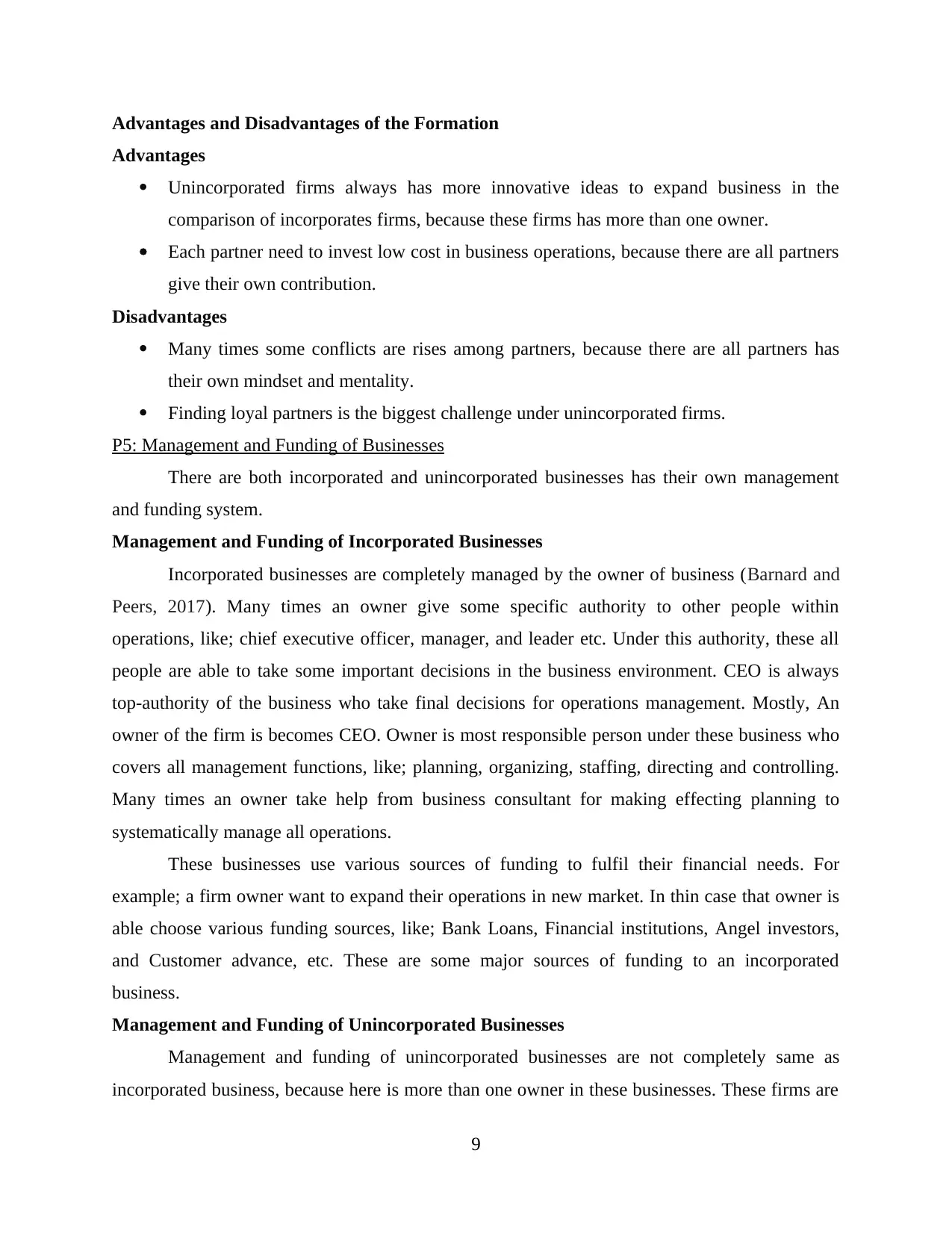
Advantages and Disadvantages of the Formation
Advantages
Unincorporated firms always has more innovative ideas to expand business in the
comparison of incorporates firms, because these firms has more than one owner.
Each partner need to invest low cost in business operations, because there are all partners
give their own contribution.
Disadvantages
Many times some conflicts are rises among partners, because there are all partners has
their own mindset and mentality.
Finding loyal partners is the biggest challenge under unincorporated firms.
P5: Management and Funding of Businesses
There are both incorporated and unincorporated businesses has their own management
and funding system.
Management and Funding of Incorporated Businesses
Incorporated businesses are completely managed by the owner of business (Barnard and
Peers, 2017). Many times an owner give some specific authority to other people within
operations, like; chief executive officer, manager, and leader etc. Under this authority, these all
people are able to take some important decisions in the business environment. CEO is always
top-authority of the business who take final decisions for operations management. Mostly, An
owner of the firm is becomes CEO. Owner is most responsible person under these business who
covers all management functions, like; planning, organizing, staffing, directing and controlling.
Many times an owner take help from business consultant for making effecting planning to
systematically manage all operations.
These businesses use various sources of funding to fulfil their financial needs. For
example; a firm owner want to expand their operations in new market. In thin case that owner is
able choose various funding sources, like; Bank Loans, Financial institutions, Angel investors,
and Customer advance, etc. These are some major sources of funding to an incorporated
business.
Management and Funding of Unincorporated Businesses
Management and funding of unincorporated businesses are not completely same as
incorporated business, because here is more than one owner in these businesses. These firms are
9
Advantages
Unincorporated firms always has more innovative ideas to expand business in the
comparison of incorporates firms, because these firms has more than one owner.
Each partner need to invest low cost in business operations, because there are all partners
give their own contribution.
Disadvantages
Many times some conflicts are rises among partners, because there are all partners has
their own mindset and mentality.
Finding loyal partners is the biggest challenge under unincorporated firms.
P5: Management and Funding of Businesses
There are both incorporated and unincorporated businesses has their own management
and funding system.
Management and Funding of Incorporated Businesses
Incorporated businesses are completely managed by the owner of business (Barnard and
Peers, 2017). Many times an owner give some specific authority to other people within
operations, like; chief executive officer, manager, and leader etc. Under this authority, these all
people are able to take some important decisions in the business environment. CEO is always
top-authority of the business who take final decisions for operations management. Mostly, An
owner of the firm is becomes CEO. Owner is most responsible person under these business who
covers all management functions, like; planning, organizing, staffing, directing and controlling.
Many times an owner take help from business consultant for making effecting planning to
systematically manage all operations.
These businesses use various sources of funding to fulfil their financial needs. For
example; a firm owner want to expand their operations in new market. In thin case that owner is
able choose various funding sources, like; Bank Loans, Financial institutions, Angel investors,
and Customer advance, etc. These are some major sources of funding to an incorporated
business.
Management and Funding of Unincorporated Businesses
Management and funding of unincorporated businesses are not completely same as
incorporated business, because here is more than one owner in these businesses. These firms are
9
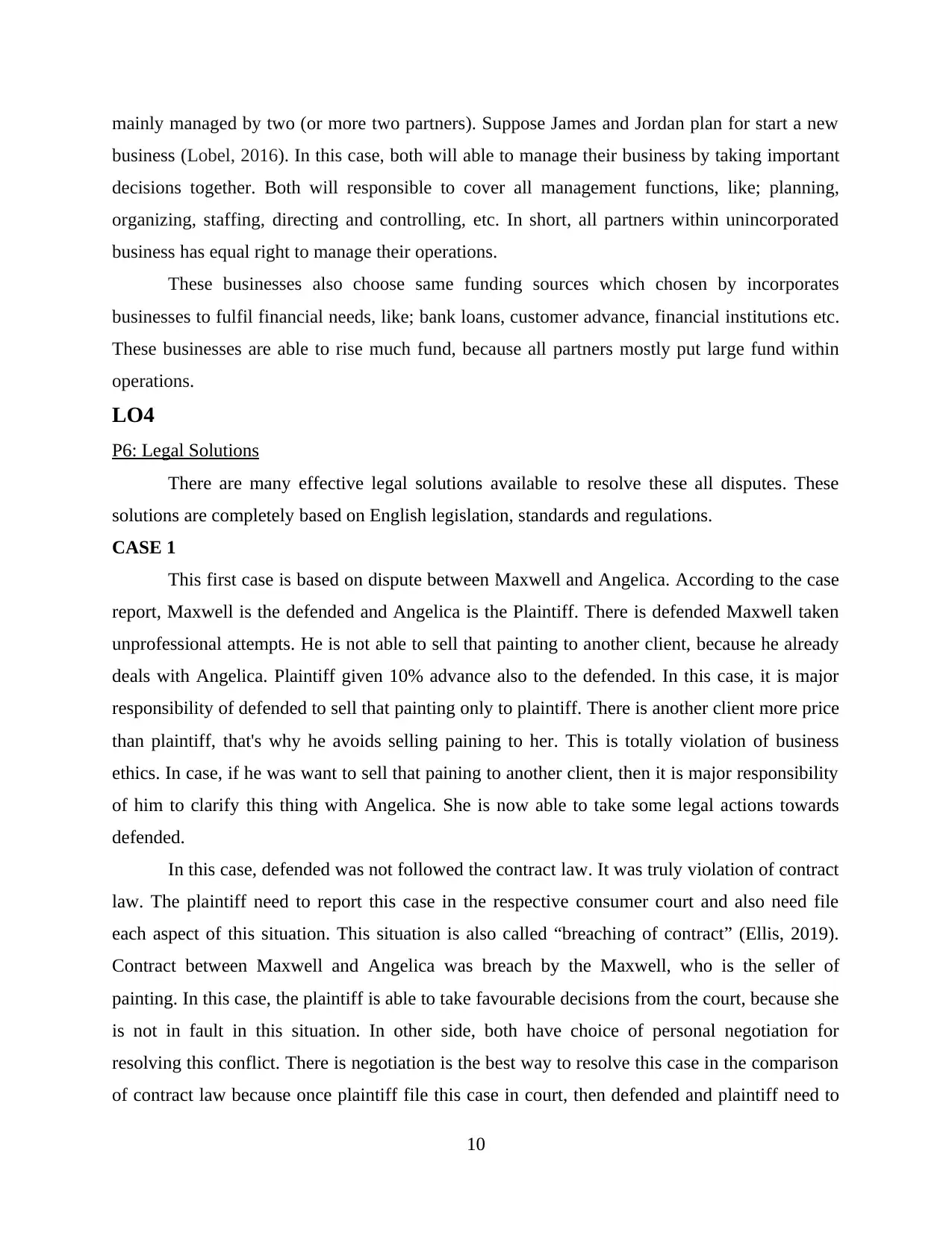
mainly managed by two (or more two partners). Suppose James and Jordan plan for start a new
business (Lobel, 2016). In this case, both will able to manage their business by taking important
decisions together. Both will responsible to cover all management functions, like; planning,
organizing, staffing, directing and controlling, etc. In short, all partners within unincorporated
business has equal right to manage their operations.
These businesses also choose same funding sources which chosen by incorporates
businesses to fulfil financial needs, like; bank loans, customer advance, financial institutions etc.
These businesses are able to rise much fund, because all partners mostly put large fund within
operations.
LO4
P6: Legal Solutions
There are many effective legal solutions available to resolve these all disputes. These
solutions are completely based on English legislation, standards and regulations.
CASE 1
This first case is based on dispute between Maxwell and Angelica. According to the case
report, Maxwell is the defended and Angelica is the Plaintiff. There is defended Maxwell taken
unprofessional attempts. He is not able to sell that painting to another client, because he already
deals with Angelica. Plaintiff given 10% advance also to the defended. In this case, it is major
responsibility of defended to sell that painting only to plaintiff. There is another client more price
than plaintiff, that's why he avoids selling paining to her. This is totally violation of business
ethics. In case, if he was want to sell that paining to another client, then it is major responsibility
of him to clarify this thing with Angelica. She is now able to take some legal actions towards
defended.
In this case, defended was not followed the contract law. It was truly violation of contract
law. The plaintiff need to report this case in the respective consumer court and also need file
each aspect of this situation. This situation is also called “breaching of contract” (Ellis, 2019).
Contract between Maxwell and Angelica was breach by the Maxwell, who is the seller of
painting. In this case, the plaintiff is able to take favourable decisions from the court, because she
is not in fault in this situation. In other side, both have choice of personal negotiation for
resolving this conflict. There is negotiation is the best way to resolve this case in the comparison
of contract law because once plaintiff file this case in court, then defended and plaintiff need to
10
business (Lobel, 2016). In this case, both will able to manage their business by taking important
decisions together. Both will responsible to cover all management functions, like; planning,
organizing, staffing, directing and controlling, etc. In short, all partners within unincorporated
business has equal right to manage their operations.
These businesses also choose same funding sources which chosen by incorporates
businesses to fulfil financial needs, like; bank loans, customer advance, financial institutions etc.
These businesses are able to rise much fund, because all partners mostly put large fund within
operations.
LO4
P6: Legal Solutions
There are many effective legal solutions available to resolve these all disputes. These
solutions are completely based on English legislation, standards and regulations.
CASE 1
This first case is based on dispute between Maxwell and Angelica. According to the case
report, Maxwell is the defended and Angelica is the Plaintiff. There is defended Maxwell taken
unprofessional attempts. He is not able to sell that painting to another client, because he already
deals with Angelica. Plaintiff given 10% advance also to the defended. In this case, it is major
responsibility of defended to sell that painting only to plaintiff. There is another client more price
than plaintiff, that's why he avoids selling paining to her. This is totally violation of business
ethics. In case, if he was want to sell that paining to another client, then it is major responsibility
of him to clarify this thing with Angelica. She is now able to take some legal actions towards
defended.
In this case, defended was not followed the contract law. It was truly violation of contract
law. The plaintiff need to report this case in the respective consumer court and also need file
each aspect of this situation. This situation is also called “breaching of contract” (Ellis, 2019).
Contract between Maxwell and Angelica was breach by the Maxwell, who is the seller of
painting. In this case, the plaintiff is able to take favourable decisions from the court, because she
is not in fault in this situation. In other side, both have choice of personal negotiation for
resolving this conflict. There is negotiation is the best way to resolve this case in the comparison
of contract law because once plaintiff file this case in court, then defended and plaintiff need to
10
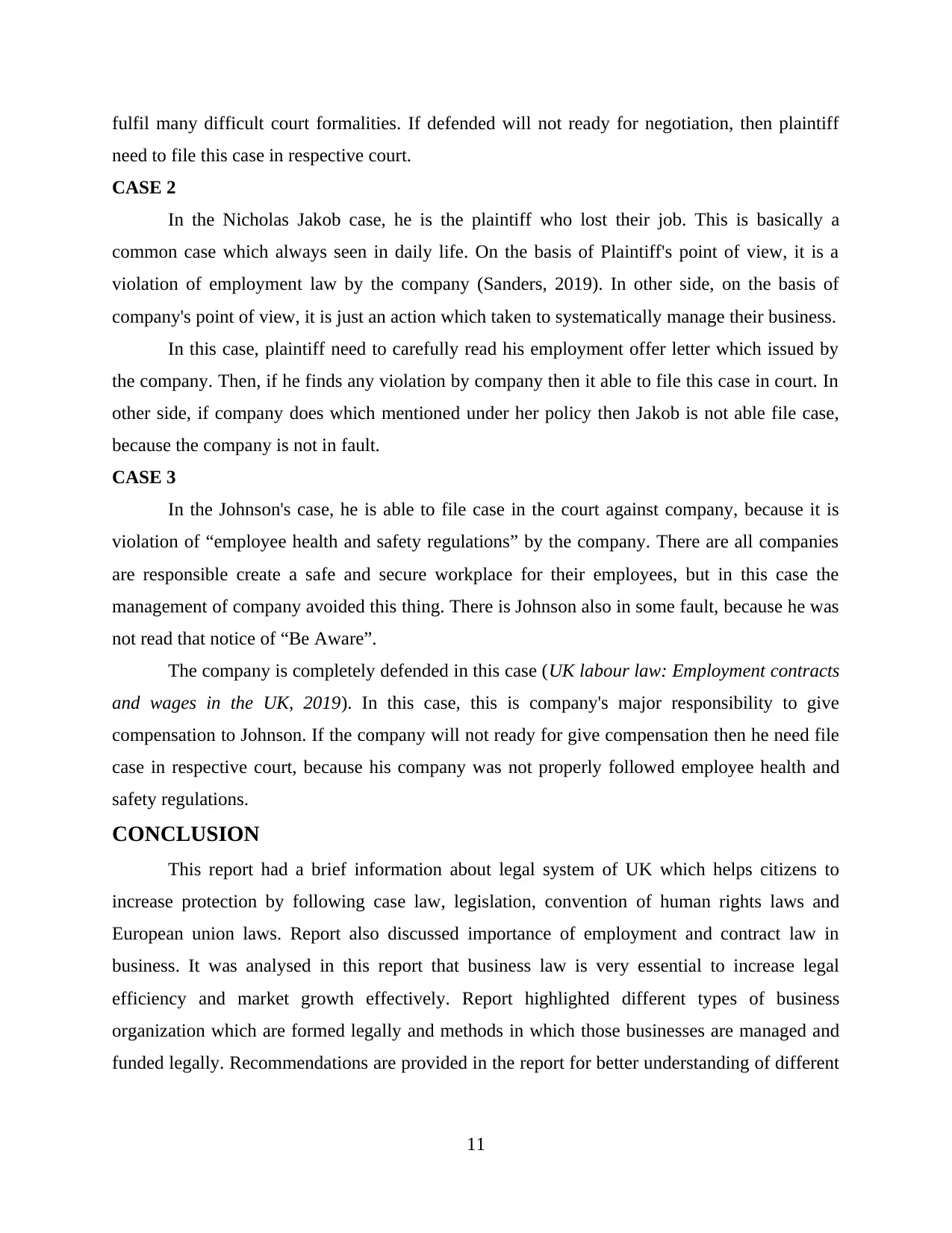
fulfil many difficult court formalities. If defended will not ready for negotiation, then plaintiff
need to file this case in respective court.
CASE 2
In the Nicholas Jakob case, he is the plaintiff who lost their job. This is basically a
common case which always seen in daily life. On the basis of Plaintiff's point of view, it is a
violation of employment law by the company (Sanders, 2019). In other side, on the basis of
company's point of view, it is just an action which taken to systematically manage their business.
In this case, plaintiff need to carefully read his employment offer letter which issued by
the company. Then, if he finds any violation by company then it able to file this case in court. In
other side, if company does which mentioned under her policy then Jakob is not able file case,
because the company is not in fault.
CASE 3
In the Johnson's case, he is able to file case in the court against company, because it is
violation of “employee health and safety regulations” by the company. There are all companies
are responsible create a safe and secure workplace for their employees, but in this case the
management of company avoided this thing. There is Johnson also in some fault, because he was
not read that notice of “Be Aware”.
The company is completely defended in this case (UK labour law: Employment contracts
and wages in the UK, 2019). In this case, this is company's major responsibility to give
compensation to Johnson. If the company will not ready for give compensation then he need file
case in respective court, because his company was not properly followed employee health and
safety regulations.
CONCLUSION
This report had a brief information about legal system of UK which helps citizens to
increase protection by following case law, legislation, convention of human rights laws and
European union laws. Report also discussed importance of employment and contract law in
business. It was analysed in this report that business law is very essential to increase legal
efficiency and market growth effectively. Report highlighted different types of business
organization which are formed legally and methods in which those businesses are managed and
funded legally. Recommendations are provided in the report for better understanding of different
11
need to file this case in respective court.
CASE 2
In the Nicholas Jakob case, he is the plaintiff who lost their job. This is basically a
common case which always seen in daily life. On the basis of Plaintiff's point of view, it is a
violation of employment law by the company (Sanders, 2019). In other side, on the basis of
company's point of view, it is just an action which taken to systematically manage their business.
In this case, plaintiff need to carefully read his employment offer letter which issued by
the company. Then, if he finds any violation by company then it able to file this case in court. In
other side, if company does which mentioned under her policy then Jakob is not able file case,
because the company is not in fault.
CASE 3
In the Johnson's case, he is able to file case in the court against company, because it is
violation of “employee health and safety regulations” by the company. There are all companies
are responsible create a safe and secure workplace for their employees, but in this case the
management of company avoided this thing. There is Johnson also in some fault, because he was
not read that notice of “Be Aware”.
The company is completely defended in this case (UK labour law: Employment contracts
and wages in the UK, 2019). In this case, this is company's major responsibility to give
compensation to Johnson. If the company will not ready for give compensation then he need file
case in respective court, because his company was not properly followed employee health and
safety regulations.
CONCLUSION
This report had a brief information about legal system of UK which helps citizens to
increase protection by following case law, legislation, convention of human rights laws and
European union laws. Report also discussed importance of employment and contract law in
business. It was analysed in this report that business law is very essential to increase legal
efficiency and market growth effectively. Report highlighted different types of business
organization which are formed legally and methods in which those businesses are managed and
funded legally. Recommendations are provided in the report for better understanding of different
11
Paraphrase This Document
Need a fresh take? Get an instant paraphrase of this document with our AI Paraphraser

disputes which are present in legal system and resolve the issues of legal to improve efficiency of
country effectively.
12
country effectively.
12
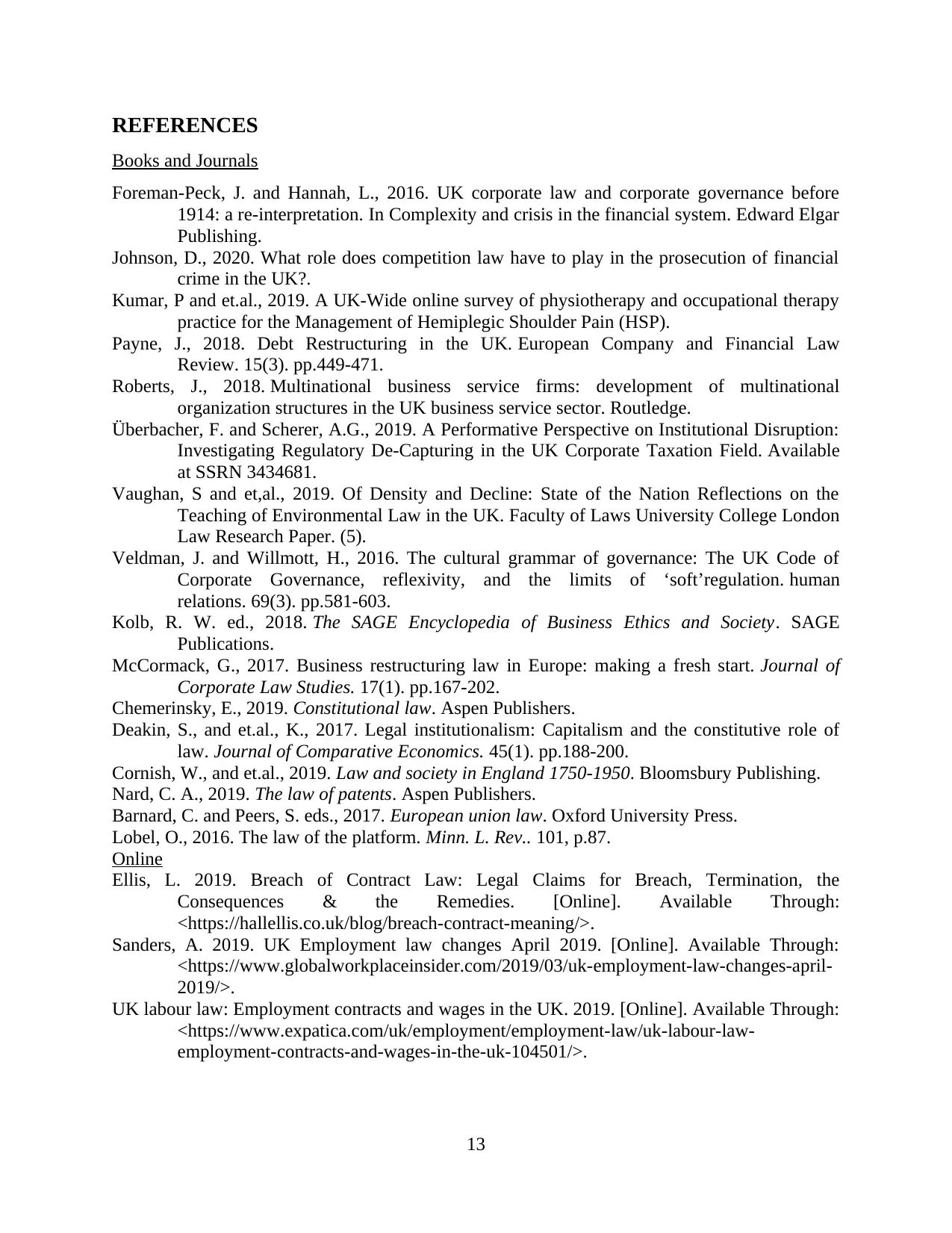
REFERENCES
Books and Journals
Foreman-Peck, J. and Hannah, L., 2016. UK corporate law and corporate governance before
1914: a re-interpretation. In Complexity and crisis in the financial system. Edward Elgar
Publishing.
Johnson, D., 2020. What role does competition law have to play in the prosecution of financial
crime in the UK?.
Kumar, P and et.al., 2019. A UK-Wide online survey of physiotherapy and occupational therapy
practice for the Management of Hemiplegic Shoulder Pain (HSP).
Payne, J., 2018. Debt Restructuring in the UK. European Company and Financial Law
Review. 15(3). pp.449-471.
Roberts, J., 2018. Multinational business service firms: development of multinational
organization structures in the UK business service sector. Routledge.
Überbacher, F. and Scherer, A.G., 2019. A Performative Perspective on Institutional Disruption:
Investigating Regulatory De-Capturing in the UK Corporate Taxation Field. Available
at SSRN 3434681.
Vaughan, S and et,al., 2019. Of Density and Decline: State of the Nation Reflections on the
Teaching of Environmental Law in the UK. Faculty of Laws University College London
Law Research Paper. (5).
Veldman, J. and Willmott, H., 2016. The cultural grammar of governance: The UK Code of
Corporate Governance, reflexivity, and the limits of ‘soft’regulation. human
relations. 69(3). pp.581-603.
Kolb, R. W. ed., 2018. The SAGE Encyclopedia of Business Ethics and Society. SAGE
Publications.
McCormack, G., 2017. Business restructuring law in Europe: making a fresh start. Journal of
Corporate Law Studies. 17(1). pp.167-202.
Chemerinsky, E., 2019. Constitutional law. Aspen Publishers.
Deakin, S., and et.al., K., 2017. Legal institutionalism: Capitalism and the constitutive role of
law. Journal of Comparative Economics. 45(1). pp.188-200.
Cornish, W., and et.al., 2019. Law and society in England 1750-1950. Bloomsbury Publishing.
Nard, C. A., 2019. The law of patents. Aspen Publishers.
Barnard, C. and Peers, S. eds., 2017. European union law. Oxford University Press.
Lobel, O., 2016. The law of the platform. Minn. L. Rev.. 101, p.87.
Online
Ellis, L. 2019. Breach of Contract Law: Legal Claims for Breach, Termination, the
Consequences & the Remedies. [Online]. Available Through:
<https://hallellis.co.uk/blog/breach-contract-meaning/>.
Sanders, A. 2019. UK Employment law changes April 2019. [Online]. Available Through:
<https://www.globalworkplaceinsider.com/2019/03/uk-employment-law-changes-april-
2019/>.
UK labour law: Employment contracts and wages in the UK. 2019. [Online]. Available Through:
<https://www.expatica.com/uk/employment/employment-law/uk-labour-law-
employment-contracts-and-wages-in-the-uk-104501/>.
13
Books and Journals
Foreman-Peck, J. and Hannah, L., 2016. UK corporate law and corporate governance before
1914: a re-interpretation. In Complexity and crisis in the financial system. Edward Elgar
Publishing.
Johnson, D., 2020. What role does competition law have to play in the prosecution of financial
crime in the UK?.
Kumar, P and et.al., 2019. A UK-Wide online survey of physiotherapy and occupational therapy
practice for the Management of Hemiplegic Shoulder Pain (HSP).
Payne, J., 2018. Debt Restructuring in the UK. European Company and Financial Law
Review. 15(3). pp.449-471.
Roberts, J., 2018. Multinational business service firms: development of multinational
organization structures in the UK business service sector. Routledge.
Überbacher, F. and Scherer, A.G., 2019. A Performative Perspective on Institutional Disruption:
Investigating Regulatory De-Capturing in the UK Corporate Taxation Field. Available
at SSRN 3434681.
Vaughan, S and et,al., 2019. Of Density and Decline: State of the Nation Reflections on the
Teaching of Environmental Law in the UK. Faculty of Laws University College London
Law Research Paper. (5).
Veldman, J. and Willmott, H., 2016. The cultural grammar of governance: The UK Code of
Corporate Governance, reflexivity, and the limits of ‘soft’regulation. human
relations. 69(3). pp.581-603.
Kolb, R. W. ed., 2018. The SAGE Encyclopedia of Business Ethics and Society. SAGE
Publications.
McCormack, G., 2017. Business restructuring law in Europe: making a fresh start. Journal of
Corporate Law Studies. 17(1). pp.167-202.
Chemerinsky, E., 2019. Constitutional law. Aspen Publishers.
Deakin, S., and et.al., K., 2017. Legal institutionalism: Capitalism and the constitutive role of
law. Journal of Comparative Economics. 45(1). pp.188-200.
Cornish, W., and et.al., 2019. Law and society in England 1750-1950. Bloomsbury Publishing.
Nard, C. A., 2019. The law of patents. Aspen Publishers.
Barnard, C. and Peers, S. eds., 2017. European union law. Oxford University Press.
Lobel, O., 2016. The law of the platform. Minn. L. Rev.. 101, p.87.
Online
Ellis, L. 2019. Breach of Contract Law: Legal Claims for Breach, Termination, the
Consequences & the Remedies. [Online]. Available Through:
<https://hallellis.co.uk/blog/breach-contract-meaning/>.
Sanders, A. 2019. UK Employment law changes April 2019. [Online]. Available Through:
<https://www.globalworkplaceinsider.com/2019/03/uk-employment-law-changes-april-
2019/>.
UK labour law: Employment contracts and wages in the UK. 2019. [Online]. Available Through:
<https://www.expatica.com/uk/employment/employment-law/uk-labour-law-
employment-contracts-and-wages-in-the-uk-104501/>.
13

The Legal System of the United Kingdom. 2020. [Online]. Available
Through:<https://www.cilex.org.uk/about_cilex/about-cilex-lawyers/what-cilex-
lawyers-do/the-uk-legal-system>.
14
Through:<https://www.cilex.org.uk/about_cilex/about-cilex-lawyers/what-cilex-
lawyers-do/the-uk-legal-system>.
14
1 out of 16
Related Documents
Your All-in-One AI-Powered Toolkit for Academic Success.
+13062052269
info@desklib.com
Available 24*7 on WhatsApp / Email
![[object Object]](/_next/static/media/star-bottom.7253800d.svg)
Unlock your academic potential
© 2024 | Zucol Services PVT LTD | All rights reserved.





